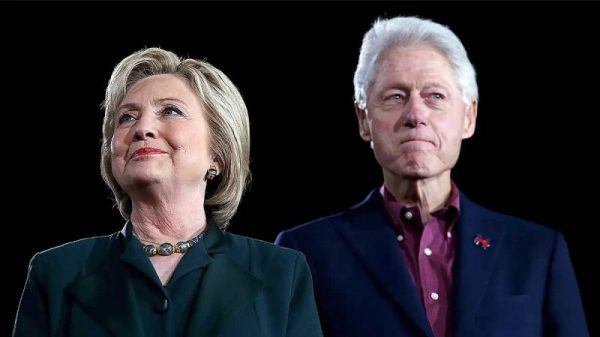Sen. Tommy Tuberville (R-Ala.) announced Tuesday that he would lift his blanket hold on military promotions, ending a nearly 10-month standoff over a Biden administration abortion policy that made the former football coach the target of bipartisan ire.
“It’s been a long fight, we fought hard,” Tuberville said after announcing his decision to his colleagues at a closed-door lunch. “We just released them.”
The hold, which Tuberville began in February, applied to all senior military promotions, and hundreds of officers were caught up in its net. As officers increasingly complained of the toll on military readiness and morale, and as a war raged in the Middle East, Tuberville faced increasing pressure from his fellow Republicans to drop the hold.
He has now narrowed his hold to the 10 or so promotions at the four-star rank. Tuberville said he relinquished the hold because he wanted to keep Senate Majority Leader Charles E. Schumer (D-N.Y.) from bringing up a vote to get around his maneuver. He did not receive any concessions he previously demanded, such as a change to the military funding bill to address the abortion policy.
“We got all we could get,” he told reporters.
Tuberville was left with few options after Schumer put forward a proposal that would allow the Senate to go around Tuberville’s holds, which had the Republican votes necessary to pass.
On Tuesday evening, Schumer confirmed more than 400 stalled promotions on the Senate floor. “I am glad this pointless and gravely damaging ordeal has finally, finally ended,” he said. “The senior senator from Alabama has nothing to show for his 10 months’ delay … except for the damage he did to our military readiness and the pain he caused to military families.”
Tuberville’s hold led to a remarkably public confrontation with some of his GOP colleagues, who staged a late-night attempt to promote the officers he had blocked, forcing him to personally object to each one. Republican Sens. Dan Sullivan (Alaska), Joni Ernst (Iowa), Todd C. Young (Ind.) and Lindsey O. Graham (S.C.), all veterans, implored Tuberville on the Senate floor to lift his hold for the sake of national security.
“No matter whether you believe it or not, Senator Tuberville, this is doing great damage to our military,” Graham said then. “I don’t say that lightly; I’ve been trying to work with you for nine months.”
Behind closed doors, Republicans have complained that Tuberville’s blockade was hurting them politically as well, given the harm to the military and the focus on abortion, which has been a losing issue at the polls for the GOP in recent elections. Senate Minority Leader Mitch McConnell (R-Ky.) took the rare step of publicly rebuking Tuberville, saying he should not be punishing “military heroes” for a Biden administration policy. Other Republican colleagues said they thought that Tuberville moved the goal posts of his demands, from initially just wanting a vote on the military abortion policy to demanding that it be rescinded altogether to allow promotions to go through.
For months, Tuberville said he wanted Schumer to do a full floor vote on each nominee to get around his hold, arguing that each one would enjoy bipartisan support and easily pass. But making it through the hundreds of nominees individually would take months of nonstop floor time — a prospect Schumer ruled out. And Democrats were concerned that allowing an individual senator to effectively shut down the chamber to confirm nonpolitical nominees would set a bad precedent.
Brig. Gen. Patrick Ryder, a Pentagon spokesman, said on Tuesday that defense officials were “encouraged” by the news, and would stay in touch with Tuberville and the rest of the Senate. As of Tuesday, there had been 451 senior military officers nominated for a total of 455 jobs, he said.
If a hold remains in place on four-star military nominations, Ryder added, at least 11 officers will be affected. The Senate could bypass those holds by holding individual votes, as it did for service chiefs during Tuberville’s hold.
“All of those positions, obviously, are key senior leadership positions,” Ryder said, noting that they include nominees for the No. 2 positions in some services. The next commanders of Indo-Pacific Command, U.S. Pacific Fleet, Air Combat Command, Cyber Command, Northern Command, and Space Command are affected.
Ryder said that after the holds are removed, it will not be “just flicking a switch,” with all of the nominees immediately taking over their new roles. Families are involved and some officers will need to move long distances in ways that need to be orchestrated.
Ryder, asked what was accomplished by Tuberville’s hold, said it was a question for the senator.
“From the Department of Defense standpoint,” he said, “we have a mission to do and we require senior leaders in key positions.”
Sen. Tommy Tuberville (R-Ala.) announced Tuesday that he would lift his blanket hold on military promotions, ending a nearly 10-month standoff over a Biden administration abortion policy that made the former football coach the target of bipartisan ire.
“It’s been a long fight, we fought hard,” Tuberville said after announcing his decision to his colleagues at a closed-door lunch. “We just released them.”
The hold, which Tuberville began in February, applied to all senior military promotions, and hundreds of officers were caught up in its net. As officers increasingly complained of the toll on military readiness and morale, and as a war raged in the Middle East, Tuberville faced increasing pressure from his fellow Republicans to drop the hold.
He has now narrowed his hold to the 10 or so promotions at the four-star rank. Tuberville said he relinquished the hold because he wanted to keep Senate Majority Leader Charles E. Schumer (D-N.Y.) from bringing up a vote to get around his maneuver. He did not receive any concessions he previously demanded, such as a change to the military funding bill to address the abortion policy.
“We got all we could get,” he told reporters.
Tuberville was left with few options after Schumer put forward a proposal that would allow the Senate to go around Tuberville’s holds, which had the Republican votes necessary to pass.
On Tuesday evening, Schumer confirmed more than 400 stalled promotions on the Senate floor. “I am glad this pointless and gravely damaging ordeal has finally, finally ended,” he said. “The senior senator from Alabama has nothing to show for his 10 months’ delay … except for the damage he did to our military readiness and the pain he caused to military families.”
Tuberville’s hold led to a remarkably public confrontation with some of his GOP colleagues, who staged a late-night attempt to promote the officers he had blocked, forcing him to personally object to each one. Republican Sens. Dan Sullivan (Alaska), Joni Ernst (Iowa), Todd C. Young (Ind.) and Lindsey O. Graham (S.C.), all veterans, implored Tuberville on the Senate floor to lift his hold for the sake of national security.
“No matter whether you believe it or not, Senator Tuberville, this is doing great damage to our military,” Graham said then. “I don’t say that lightly; I’ve been trying to work with you for nine months.”
Behind closed doors, Republicans have complained that Tuberville’s blockade was hurting them politically as well, given the harm to the military and the focus on abortion, which has been a losing issue at the polls for the GOP in recent elections. Senate Minority Leader Mitch McConnell (R-Ky.) took the rare step of publicly rebuking Tuberville, saying he should not be punishing “military heroes” for a Biden administration policy. Other Republican colleagues said they thought that Tuberville moved the goal posts of his demands, from initially just wanting a vote on the military abortion policy to demanding that it be rescinded altogether to allow promotions to go through.
For months, Tuberville said he wanted Schumer to do a full floor vote on each nominee to get around his hold, arguing that each one would enjoy bipartisan support and easily pass. But making it through the hundreds of nominees individually would take months of nonstop floor time — a prospect Schumer ruled out. And Democrats were concerned that allowing an individual senator to effectively shut down the chamber to confirm nonpolitical nominees would set a bad precedent.
Brig. Gen. Patrick Ryder, a Pentagon spokesman, said on Tuesday that defense officials were “encouraged” by the news, and would stay in touch with Tuberville and the rest of the Senate. As of Tuesday, there had been 451 senior military officers nominated for a total of 455 jobs, he said.
If a hold remains in place on four-star military nominations, Ryder added, at least 11 officers will be affected. The Senate could bypass those holds by holding individual votes, as it did for service chiefs during Tuberville’s hold.
“All of those positions, obviously, are key senior leadership positions,” Ryder said, noting that they include nominees for the No. 2 positions in some services. The next commanders of Indo-Pacific Command, U.S. Pacific Fleet, Air Combat Command, Cyber Command, Northern Command, and Space Command are affected.
Ryder said that after the holds are removed, it will not be “just flicking a switch,” with all of the nominees immediately taking over their new roles. Families are involved and some officers will need to move long distances in ways that need to be orchestrated.
Ryder, asked what was accomplished by Tuberville’s hold, said it was a question for the senator.
“From the Department of Defense standpoint,” he said, “we have a mission to do and we require senior leaders in key positions.”





















